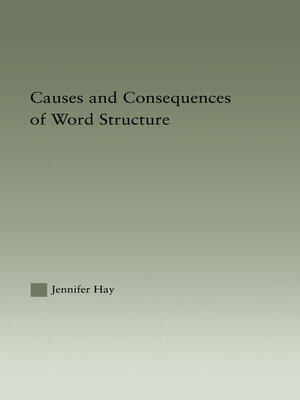Causes and Consequences of Word Structure
ebook ∣ Outstanding Dissertations in Linguistics
By Jennifer Hay

Sign up to save your library
With an OverDrive account, you can save your favorite libraries for at-a-glance information about availability. Find out more about OverDrive accounts.
Find this title in Libby, the library reading app by OverDrive.



Search for a digital library with this title
Title found at these libraries:
| Library Name | Distance |
|---|---|
| Loading... |
This book explores effects of speech perception strategies upon morphological structure. Using connectionist modeling, perception and production experiments, and calculations over lexica, Jennifer Hay investigates the role of two factors known to be relevant to speech perception: phonotactics and lexical frequency. Hay demonstrates that low probability phoneme transitions across morpheme boundaries exert a considerable force toward the maintenance of complex words, and argues that the relative frequency of the derived form and the base significantly affects the decomposability of complex words. While many have claimed that high frequency forms do not tend to be decomposed, Hay asserts that this follows only when such forms are more frequent than the bases they contain. The results of Hay's experiments illustrate the tight connection between speech processing, lexical representations, and aspects of linguistic competence. The likelihood that a form will be parsed during speech perception has profound consequences, from its grammaticality as a base of affixation, through to fine details of its implementation in the phonetics.







